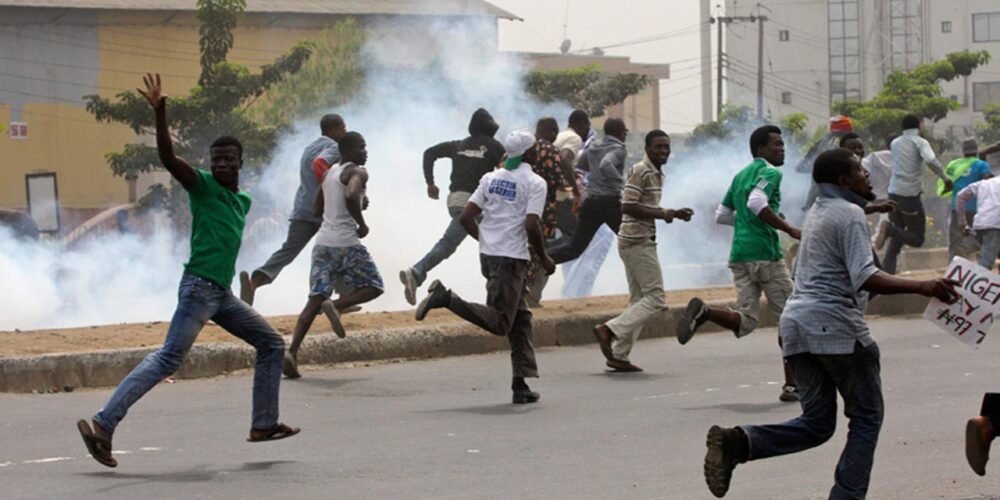5 min read
Summary: The security situation in Nigeria is worsening, despite the efforts of the leadership. The recent security crises such as abduction/kidnapping and banditry in the Nothern local communities have been a cause for concern. Northern Nigeria has remained vulnerable to several of these security threats due to factors such as; the Nigeria-Niger porous borders, arms, and weapons trafficking, poor governance, poverty, and climate change-fragility links, and overburdening of security instruments, and a decreasing presence of the federal government.
In spite of government efforts, the security situation in Nigeria is deteriorating. Indeed, the lingering conflict between herders and farmers in north-central Nigeria has been rated six times deadlier than the Boko Haram insurgency. The recent abductions of schoolboys in Kankara community, Katsina State and in Niger State are more examples of the deplorable state of security in the country. Notably, the unprecedented increase in violent attacks is defying the sustained narrative among analysts that the northwest is relatively peaceful compared to the northeast—even though the northwest is poorer; worse governed in some areas; and has lower levels of human development.
THE BANDITRY-TERRORISM NEXUS IN NORTHWEST NIGERIA
The rising insecurity in the northwest—vicious attacks on local communities and kidnapping of people by criminal groups in the region—is being described by state officials as banditry. However, further evidence suggests that the government is simplifying the dynamics. In actuality, northwestern Nigeria has become the safe haven of increasingly active terrorist groups, including the Islamic State in the Greater Sahara (ISGS); Jama’at Nusrat al Islam wal Muslimin (JNIM); Al Qaida in the Islamic Maghreb; a splinter of Boko Haram popularly referred to as the Islamic State in West Africa Province (ISWAP); and the Fulani herdsmen of West Africa once rated the fourth-deadliest terror group in the world.
The recent Kankara abduction bears the operational footprints of the Boko Haram group that has perfected the act through previous abductions of schoolgirls in Chibok and Dapchi in northeastern Nigeria. This incident gives credence to the jihadists’ perpetual attempt to forge an alliance with splinter terror groups in the northwest. While Boko Haram maintains a coordinating center in the Lake Chad Basin, ISWAP operates from southwestern Niger. These two centers of jihadism are separated by northwest Nigeria, increasing the likelihood of interaction and collaboration among these actors there.
WHY NORTHWESTERN NIGERIA IS VULNERABLE TO INCESSANT VIOLENT ATTACKS
In addition to its location between these groups, the northwest region is highly susceptible to violent attacks by the various terror groups due to a combination of mutually reinforcing factors. Primary factors include:
- Porous Nigeria-Niger borders and difficult terrain. Nigeria’s border with Niger spans 1,497 km and is poorly policed by the Nigeria Custom and Immigration Services. The porous nature of these borders heightens the potential spread of terrorist activities into northwest Nigeria from Burkina Faso, Mali, and Niger. The vulnerability of the border to the infiltration of terror groups is compounded by the forest reserves in the region. The vast, rugged terrain, sparse population, and dense vegetation make surveillance difficult—making the forests ideal hiding places and operational bases for the terror groups. Furthermore, the forested landscape constitutes ungoverned spaces, where the presence of the authorities is either nonexistent or, at best, sporadic.
- Arms and weapons trafficking. The groups terrorizing northwest Nigeria are known to deploy sophisticated weapons in their operations; again, often due to the porous Nigeria-Niger border and subsequent arms trafficking. The illicit proliferation of weapons exerts a considerable impact on peace and security and increases the incidence of terrorists’ activities in the region.
- Poor governance, poverty, and climate change-fragility nexus. In many instances, the rising incidents of violent attacks are symptoms of weak, exclusionary, or exploitative governance systems in northwest Nigeria. Compounding factors include weak institutional capacity within the police; extreme inequality, poverty, unemployment; and citizens’ alienation from the government. Indeed, five of the country’s 10 poorest states—Sokoto, Katsina, Zamfara, Kebbi, and Jigawa—are in the northwest region. Evidence suggests that population explosion, poor governance, and high incidence of poverty could render many unemployed youths more vulnerable to recruitment by terror groups in the region. Closely connected to this is the intensive desertification of the Sahara. Climate change is wreaking havoc on people’s livelihoods and facilitating the recruitment of poor farmers and vulnerable youths into terrorist groups in the region.
- Overburdened security apparatus and diminishing presence of the federal government. The state security response to the rising insecurity in the region is compromised by the decadelong war with Boko Haram in the northeast, deteriorating security in the Niger Delta, farmer-herder conflicts in north-central and southern Nigeria, and other forms of criminality across the country. In fact, the Nigerian military services are on active deployment in no fewer than 30 states of the federation, tackling internal security threats that ordinarily should have been left to the police to contain. With security forces stretched, terror groups have been able to operate with little resistance in the northwest. Furthermore, terrorists and criminals appear to be emboldened given the federal government’s weakening engagement.
- Controversial peace agreements between some state governments and criminal groups. In an attempt to stop these attacks, and due to larger failures on the part of the federal government, the state governments of Katsina, Sokoto, and Zamfara initiated direct negotiations with these criminal groups. As part of these negotiations, the governors offered the criminal groups amnesties and other incentives to end violent attacks. Some have even agreed to release all arrested persons from such groups in exchange for hostages. So far, these agreements have failed for a number of reasons: First, these criminal groups lack central command and a common goal, so it has been difficult to bring them all to a common negotiation. Moreover, agreements made with one group are not binding on others. Second, the dialogues excluded the local communities that bear the brunt of violence and expect the state to deliver forms of compensation, justice, and protection as a condition for durable peace. Collapsed negotiations have led to renewed attacks by the criminal groups, while the farmers and vigilantes acting on their behalf have also remained completely unaccountable. Beyond these negotiations is the problem that the state governments have no capacity to enforce the agreements and are barely equipped to address many of the underlying causes of insecurity, including shrinking space for grazing and porous borders.
- Illegal mining activities. Competition over access to mineral resource deposits in Katsina and Zamfara states exacerbates already-existing tensions. Often terror groups control the minefields and are able to act with impunity because of the undue patronage they benefit from the authorities through connivance. The syndicates also fund banditry and cattle rustling in mining communities, displacing and inciting violence among Fulani pastoralists and farming communities.
POLICY RECOMMENDATIONS
The policy solutions for the security challenges plaguing the northwestern states of Nigeria must be multipronged and include:
Better supported border security and stamping down on corruption. The federal government must collaborate with state governments to address the immediate challenge of border porosity. Concerted efforts to recruit, train, and post adequately equipped customs and immigration personnel to the region can boost surveillance and stem the tide of the free flow of arms into the country. Moreover, addressing corruption here is pivotal, because border patrol is a major racket for security forces and government officials. The ongoing military response must also be sustained through strategic coordination with the counterterrorism unit of the Nigerian police force, while the recent introduction of drone surveillance and anti-banditry bombardment is maintained.
Recommendation(s):
• The federal government must work with state governments to address the urgent challenge of border porosity by recruiting well-trained personnel and equip customs and immigration personnel for routine border surveillance.
• Joint efforts to recruit, train and deploy customs migrants with the right equipment can enhance surveillance and prevent the free influx of weapons.
• The current military response must also be sustained through strategic collaboration with the Nigerian Police’s counter-terrorism department, while drone monitoring and anti-bandit bombardment are continued.
About the Author(s):
-Oluwole Ojewale – ENACT Program’s Regional Organized Crime Observatory Coordinator for Central Africa – Institute for Security Studies, Dakar, Senega
Source: Brookings
Keywords: Insecurity, Nigeria, Terrorism, Banditry, Northwest













